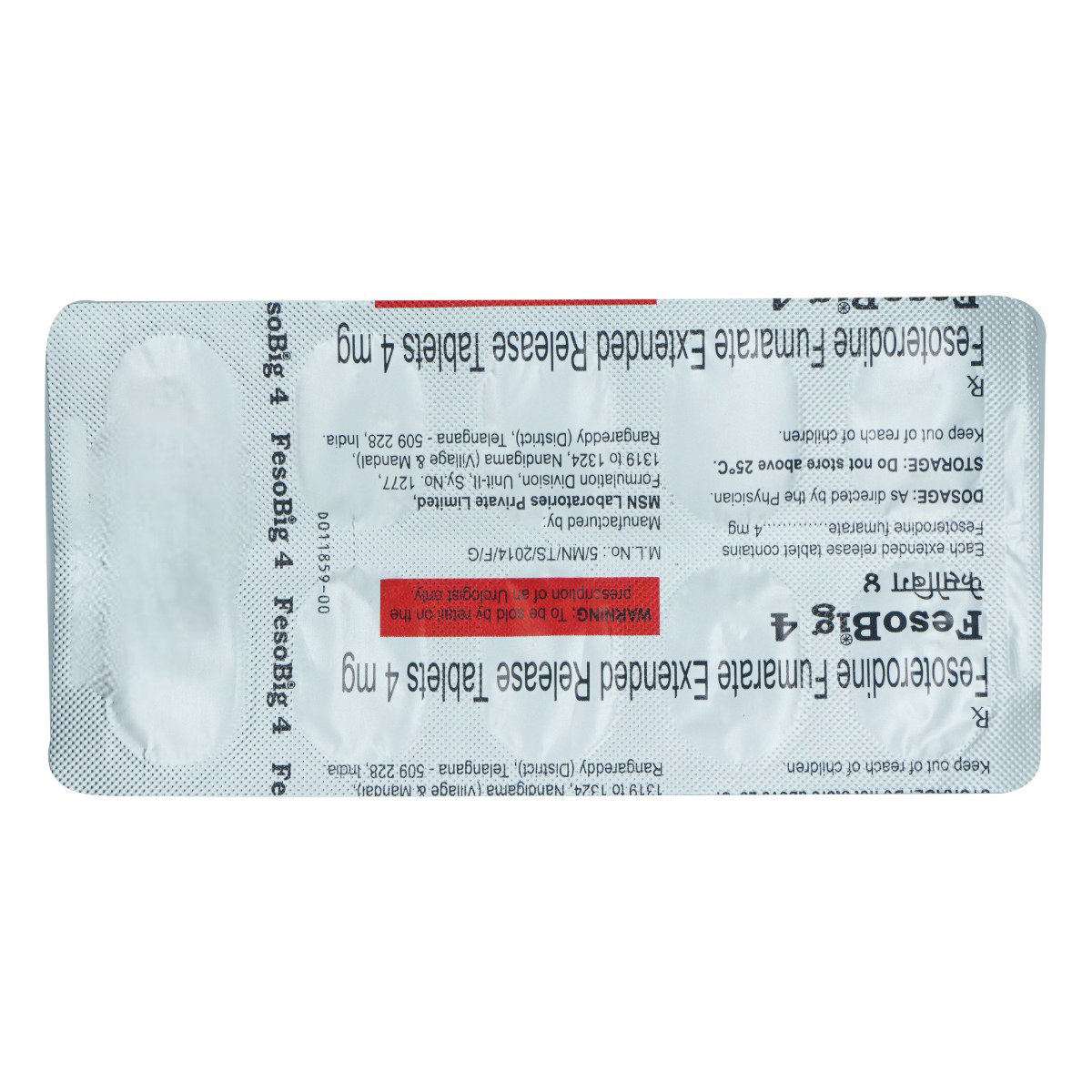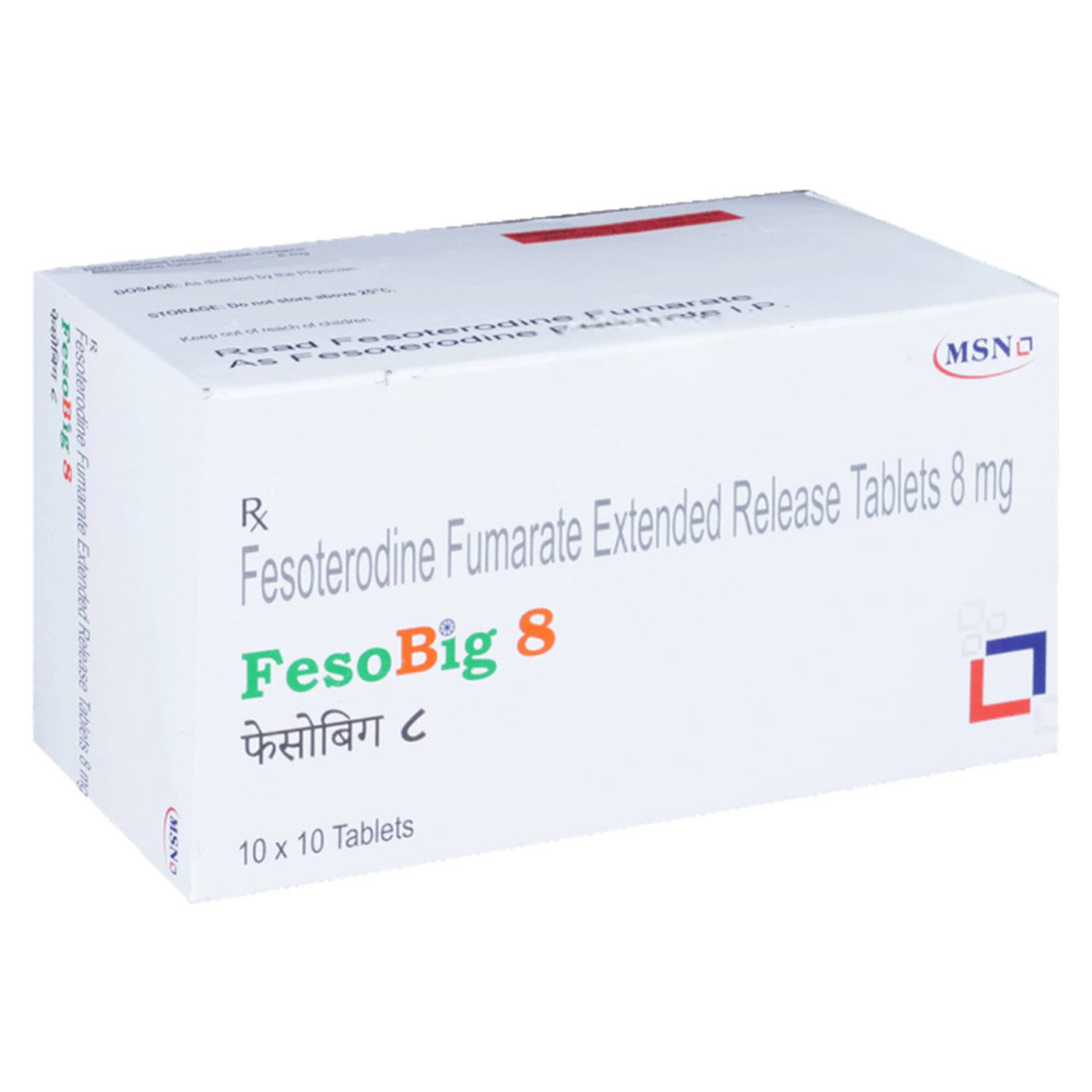Fesoterodine Fumarate
About Fesoterodine Fumarate
Fesoterodine Fumarate is indicated in the treatment of overactive bladder. Overactive bladder is a condition in which there is a problem with bladder function and causes a sudden urge to urinate that might be difficult to control.
Fesoterodine Fumarate contains Fesoterodine fumarate, which works by relaxing bladder muscles. This helps relieve symptoms of an overactive bladder, such as urinary incontinence, urgency, and increased urinary frequency.
In some cases, Fesoterodine Fumarate may cause side effects such as dry mouth, constipation, headache, nausea, and dizziness. Most of these side effects may not require medical attention and resolve gradually over time. However, consult the doctor if the side effects persist or worsen.
Consult the doctor if you are pregnant or breastfeeding. Fesoterodine Fumarate is not recommended for children. Drive only if you are alert, as this medicine may cause dizziness. Keep the doctor informed about your health condition and medications to rule out any side effects/interactions.
Uses of Fesoterodine Fumarate
Medicinal Benefits
Fesoterodine Fumarate is indicated for the treatment of overactive bladder. It contains Fesoterodine fumarate, an anti-muscarinic agent that works by relaxing bladder muscles. Thus, it helps relieve symptoms of overactive bladder, such as urinary incontinence, urgency, and increased urinary frequency.
Directions for Use
- Fesoterodine Fumarate can be taken with or without food.
- Follow your doctor's instructions on the dosage and timing of this medication.
- Swallow Fesoterodine Fumarate as a whole with a glass of water.
- Do not crush, chew, or break it.
Storage
Side Effects of Fesoterodine Fumarate
- Dry mouth
- Constipation
- Indigestion
- Dysuria (pain while urinating)
- Diarrhoea
- Nausea
- Insomnia (difficulty sleeping)
- Dizziness
- Stomach pain
Drug Warnings
Do not take Fesoterodine Fumarate if you are allergic to any of its components, if you have urinary retention (unable to empty your bladder), gastric retention (delayed or slow stomach emptying), or uncontrolled narrow-angle glaucoma. Inform the doctor if you have/had stomach or intestinal problems, weak urine stream, problems emptying your bladder, decreased bowel movements/constipation problems, myasthenia gravis (muscle weakness), liver or kidney problems, ulceration/inflammation of the colon, toxic megacolon (an abnormally large or distended colon), autonomic neuropathy, heartburn or belching, urinary tract infection, gastrointestinal disease that affects the passage and/or digestion of food or heart problems (QT prolongation, irregular heartbeat). Consult the doctor if you are pregnant or breastfeeding. Let the doctor know if you are taking any other medicines, including supplements and herbal products.
Drug Interactions
Drug-Drug Interactions: Inform the doctor if you are taking an antihistamine (diphenhydramine), anti-depressant (duloxetine), a medicine used to treat OAB (mirabegron), painkiller (acetaminophen/hydrocodone, tramadol), or antimuscarinic (solifenacin).
Drug-Food Interactions: Avoid consuming grapefruit juice with Fesoterodine Fumarate as it may increase the effects of the medicine.
Drug-Disease Interactions: Inform the doctor if you have gastrointestinal retention, narrow-angle glaucoma, urinary retention, liver/kidney problems, or myasthenia gravis (muscle problems).
Drug-Drug Interactions Checker List:
Safety Advice

Alcohol
consult your doctorIt is unknown if alcohol interacts with Fesoterodine Fumarate. Please consult your doctor.

Pregnancy
cautionFesoterodine fumarate belongs to pregnancy category C. There are no adequate and well-controlled studies in pregnant women. Please consult the doctor if you are pregnant.

Breast Feeding
cautionIt is not known if Fesoterodine fumarate is excreted in human milk. Please consult the doctor if you are breastfeeding.

Driving
cautionFesoterodine Fumarate may cause blurred vision, sleepiness and dizziness. Drive or operate machinery only if you are alert.

Liver
cautionFesoterodine Fumarate is not recommended in people with severe hepatic impairment. Please consult the doctor if you have liver problems or any concerns regarding this.

Kidney
cautionDose adjustment may be needed in patients with severe renal impairment. Please consult the doctor if you have kidney problems or any concerns regarding this.

Children
unsafeFesoterodine Fumarate is not recommended for children as the safety and effectiveness have not been established.
Habit Forming
Diet & Lifestyle Advise
- Pelvic floor exercises would be helpful in treating bladder spasms.
- Avoid foods like sugars, carbonated beverages, citrus fruits, tomatoes, spicy foods, chocolate and tea.
- Avoid/limit drinking excess alcohol or caffeinated drinks as they can worsen the symptoms.
- Maintain a healthy weight and exercise regularly.
- Quit smoking.
- Avoid processed foods. Instead, choose whole, unprocessed foods.
- Include fruits, vegetables, and fibre-rich food in your diet.
Patients Concern
Disease/Condition Glossary
Overactive bladder (OAB): Overactive bladder is a condition in which there is a problem with bladder function and causes a sudden urge to urinate that might be difficult to control. Overactive bladder is characterised by involuntary leakage of urine, excessive urination, and urgent need to urinate. The common causes of bladder spasms are urinary tract infections, drinking too much caffeine or alcohol, diabetes, constipation, impaired kidney function, bladder stones, enlarged prostate, or neurological disorders.
FAQs
Fesoterodine Fumarate is used to treat overactive bladder, a condition characterized by problems with bladder function.
Fesoterodine Fumarate works by relaxing bladder muscles and relieving the symptoms of overactive bladder.
Dry mouth could be a side effect of Fesoterodine Fumarate. Limiting caffeine intake, avoiding smoking and mouthwashes containing alcohol; drinking water regularly, and chewing sugar-free gum/candy might stimulate saliva and prevent drying of the mouth.
Do not stop taking Fesoterodine Fumarate without consulting your doctor, as it might cause a relapse of symptoms or make them worse. To treat your condition effectively, continue taking Fesoterodine Fumarate for as long as it has been prescribed. Talk to your doctor if you have any concerns.






